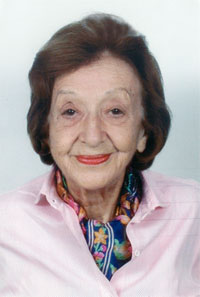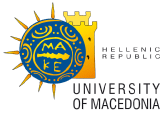 Hari Brissimi passed away on Tuesday, May 25, 2021, at the age of 102.
Hari Brissimi passed away on Tuesday, May 25, 2021, at the age of 102.Dr.h.c. Hari Brissimi dedicated her life to aiding refugees and the needy. She was born in Volos (Greece) and studied in Athens, graduating from Athens Pierce College (Junior College Diploma). She began her humanitarian mission by helping to procure food for starving families during the German occupation in World War II. Hari Brissimi was also a member of the Governing Board of the “Working Girls Center”, responsible for organizing educational and recreational activities in Volos (1941-1944). After the war, she joined UNRRA, a United Nations relief organization (Regional Chief for Child Welfare Projects in Thessaly, Greece) until 1946, when she was granted a scholarship to study Sociology at Smith College (USA) from where she graduated in 1948. In her senior year she was elected to Phi Beta Kappa. By 1950 Hari Brissimi had obtained her master’s degree in social work from Columbia University (USA) specializing in Community Organization. At the same time, she became the Chairman of the “Friends of the Greek Village” who were active in New York, USA, securing Welfare aid for Greek villages (1950-1951).
After her return to Greece she became a Consultant on Social Welfare Programs, in the Greek Ministry of Coordination. In 1955, she joined the United Nations High Commissioner for Refugees (UNHCR) in Greece, undertaking the promotion of programmes to house, train and establish refugees who had fled to Greece, where she worked for seven years before moving to Geneva. There she promoted refugee-assistance programs on several continents, and in 1978 she became the first woman Director of UNHCR.
As Director for Counseling, Education and Resettlement with global responsibility, among her tasks were two operations that received much publicity: a) to plan and implement programs for the resettlement of the “boat people” who left Vietnam on small boats, risking their lives in order to seek asylum elsewhere, b) to ensure the release of the refugees held in the “Stadium” of Santiago, Chile in September 1973 arranging for their resettlement in other countries. In 1981, just after her retirement from the UNHCR, the Organization was awarded the Nobel Peace Prize for dealing with a “veritable flood of human catastrophe”, in recognition of the Organization’s work on behalf of the Vietnamese boat people.
Retirement did not stop her from pursuing her life’s work. In 1989 she helped to found, and served as its first president, the Greek Council for Refugees, the only NGO in Greece dealing exclusively with Refugee issues, which has contributed to a great extent to the reform of the Greek law to protect refugees. Moreover, she served as Vice President of the Board of the Athens Welfare Institution, “Mitera” which took care of abandoned children (1990-1992).
For all her humanitarian action, Hari Brissimi was honored by the Academy of Athens, the Greek Holy Synod, while she received an Honorary Doctor’s Degree and by Smith College. In 2007 she was honored for her contribution to the promotion of international human rights protection during the opening ceremony of Thessaloniki International Student Model United Nations, held at the University of Macedonia.
View more here.
